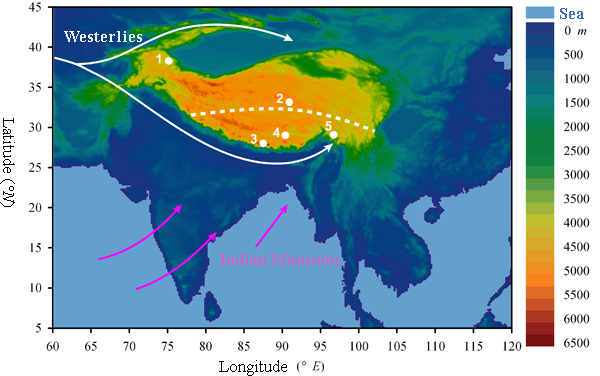
Locationof the five ice core drilling sites for black carbon study on the Tibetan Plateau (Picture provided by ITP)
Prof. XU Baiqing of the Institute of Tibetan Plateau Research (ITP) has recently published the paper, "Black soot and the survival of Tibetan glaciers", on the Proceedings of National Academy of Sciences (PNAS).

In collaboration with colleagues from the Institute of Earth Environment and Cold and Arid Regions Environmental and Engineering Research Institute in the CAS and those from the NASA, Prof. XU analyzed black soot composition in ice cores retrieved from a wide range over the Plateau. The research team thereupon revealed the temporal and spatial variation patterns of black carbon in snow and ice on the Tibetan Plateau since the 1950s, thus suggesting the accelerated glacial melting on the Tibetan Plateau due to black soot deposition.
|
Spatial distribution of black carbon over the Gangrigabu Glacier, southeast Tibetan Plateau, and its variation with time (Picture provided by ITP) |
With the increasing concern in the influence of aerosols emission on climate and environment worldwide, their study made a successful stab at the understanding of black carbon composite in the tropical Himalayas. Their discovery confirmed the role of black carbon in the atmospheric brown cloud in heating the high-altitudes atmosphere, calling on people’s attention to the accelerated glacial melting on the Tibetan Plateau.
Paper abstract:
http://www.pnas.org/content/early/2009/12/07/0910444106.abstract
Related:
http://www.sciencedaily.com/releases/2009/12/091214173658.htm

86-10-68597521 (day)
86-10-68597289 (night)

52 Sanlihe Rd., Xicheng District,
Beijing, China (100864)

